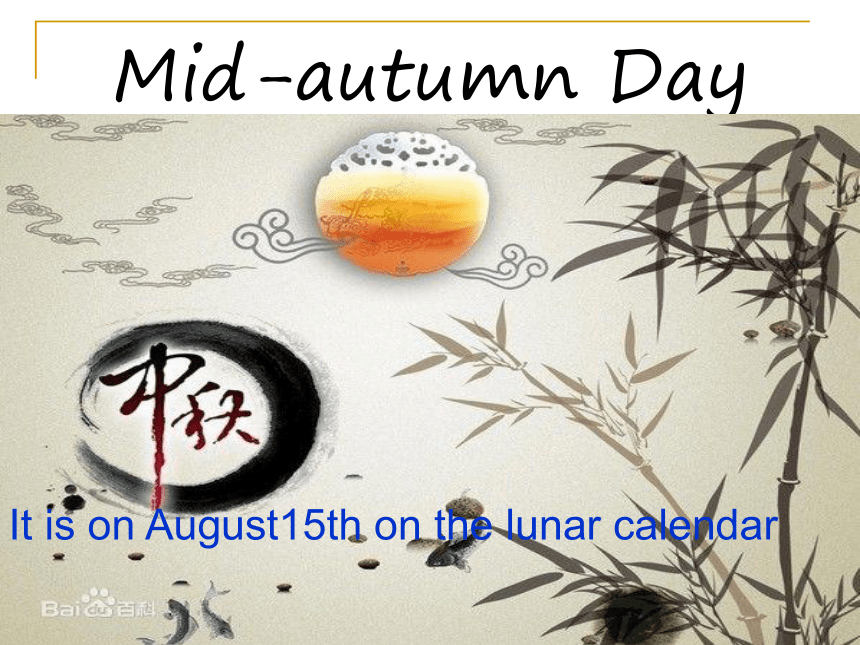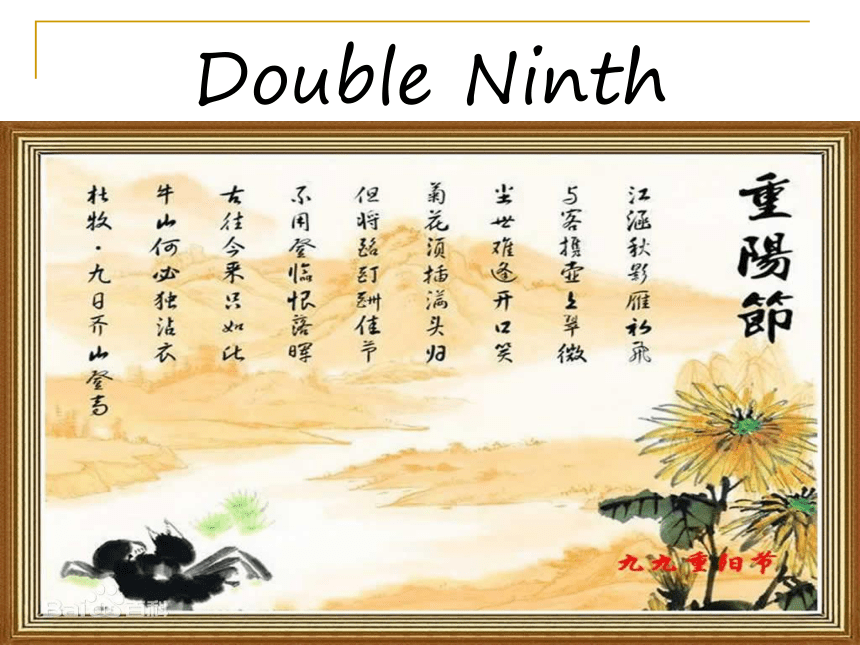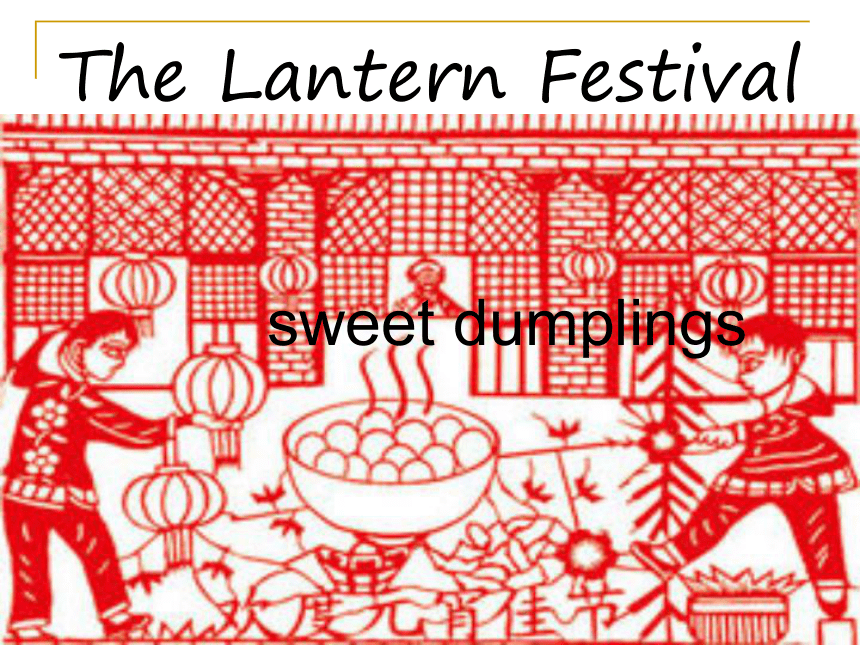Unit 8 The Spring Festival PC 课件
文档属性
| 名称 | Unit 8 The Spring Festival PC 课件 |

|
|
| 格式 | zip | ||
| 文件大小 | 3.5MB | ||
| 资源类型 | 教案 | ||
| 版本资源 | 闽教版(三年级起点) | ||
| 科目 | 英语 | ||
| 更新时间 | 2017-08-21 20:29:13 | ||
图片预览












文档简介
课件40张PPT。The Spring FestivalThe Spring FestivalSome important festivalsQingming Festival
International Labor DayDragon Boat FestivalMid-autumn DayIt is on August15th on the lunar calendarNational DayIt’s on October 1stDouble Ninth FestivalWhat is the date of…?Thanksgiving DayChristmas DayNew Year’s DayThe Spring FestivalThe Lantern Festivalsweet dumplingsWhich festival do you like best? Why?春节由来 相传中国古时候有一种叫“年”的怪兽,头长触角,凶猛异常。“年”长年深居海底,每到除夕才爬上岸,吞食牲畜伤害人命。因此,每到除夕这天,村村寨寨的人们扶老携幼逃往深山,以躲避“年”兽的伤害。
这年除夕,桃花村的人们正扶老携幼上山避难,从村外来了个乞讨的老人,只见他手拄拐杖,臂搭袋囊,银须飘逸,目若朗星。乡亲们有的封窗锁门,有的收拾行装, 有的牵牛赶羊,到处人喊马嘶,一片匆忙恐慌景象。这时,谁还有心关照这位乞讨的老人?只有村东头一位老婆婆给了老人些食物,并劝他快上山躲避 “年”兽,那老人捋髯笑道:婆婆若让我在家呆一夜,我一定把“年”兽撵走。老婆婆惊目细看,见他鹤发童颜、精神矍铄,气宇不凡。可她仍然继续劝说,乞讨老人笑而不语。婆婆无奈,只好撇下家,上山避难去了。半夜时分,“年”兽闯进村。它发现村里气氛与往年不同:村东头老婆婆家,门贴大红纸,屋内烛火通明。“年”兽浑身一抖,怪叫了一声。“年”朝婆婆家怒视片刻,随即狂叫着扑过去。 将近门口时,院内突然传来“砰砰啪啪”的炸响声,“年”浑身战栗,再不敢往前凑了。
原来, “年”最怕红色、火光和炸响。这时,婆婆的家门大开,只见院内一位身披红袍的老人在哈哈大笑。“年”大惊失色,狼狈逃蹿了。
第二天是正月初一,避难回来的人们见村里安然无恙十分惊奇。这时,老婆婆才恍然大悟,赶忙向乡亲们述说了乞讨老人的许诺。乡亲们一齐拥向老婆婆家,只见婆婆家门上贴着红纸,院里一堆未燃尽的竹子仍在“啪啪”炸响,屋内几根红腊烛还 发着余光……欣喜若狂的乡亲们为庆贺吉祥的来临, 纷纷换新衣戴新帽,到亲友家道喜问好。这件事很快在周围村里传开了,人们都知道了驱赶“年”兽的办法。
从此每年除夕,家家贴红对联、燃放爆竹;户户烛火通明、守更待岁。初一一大早,还要走亲串友道喜问好。这风俗越传越广,成了中国民间最隆重的传统节日clean housesgoods for use during the Spring FestivalEast or west, home is best.Hakka traditional food客家米酒Spring Festival coupletsred lanternscolorful paper-cutsget new clothes for childrendelicious foodlucky moneyset off crackers and fireworksSome language points1.句中的is coming是进行时,表示将来要发生的动作。英语中有些动词可用进行时表将来,如come, go, arrive, get, return等。
e.g. My friend is leaving for Shanghai.
我的朋友要动身前往上海了。
2. the lunar calendar “阴历,农历”
the solar calendar “阳历”
Lunar New Year’s Eve “农历除夕夜”
3.no matter how…“无论……”。
e.g. No matter how difficult the question is, we have to answer it.无论问题多难,我们都得回答。
另外,no matter what “无论什么”
no matter who “无论谁”
no matter where “无论哪儿”
no matter when “无论何时”等都可以用来引导让步状语从句。
e.g. No matter what he said, we couldn’t believe him.无论他说什么,我们都不信。
4. try to do…“尽量做……,设法做……”
e.g. We try to help the old man to find his way home. 我们设法帮助老人找到回家的路。
5. just as… “正如……”。
e.g. Just as the teacher said, English is not so difficult to learn.正如老师所说的那样,英语并不那么难学。
6. the old saying “谚语,常言”。
7. prepare for “为……做准备”。
e.g. They are preparing for the party.他们正在为聚会做准备。
8. sweep out…“扫除……,清除……”。e.g. Could you help me sweep out the snow? 你能帮我清除积雪吗?
9. meaning …动词-ing短语作伴随状语。
e.g. The boy lay on the ground, looking at the sky. 男孩躺在地上,望着天空。
hang up…“把……挂起来”。
e.g. You may hang up the map on the blackboard.你可以把地图挂在黑板上10. on both sides of…“在……的两边”。
e.g. There are some trees on both sides of the road. 在路的两边有一些树。
11. make+n.+adj.“使……处于……状态”。
e.g. He tries to make his lesson lively and interesting. 他设法使他的课生动有趣。12. so that引导目的状语从句,通常从句中有情态动词can, could, may, might等。
e.g. He studies very hard so that he can pass the exams. 他学习非常努力以便能够通过考试。
13. as for…“谈到……,至于……”。
e.g. As for Chairman Mao, it is well known to everyone.说起毛主席,大家众所皆知。14. at midnight “在午夜”。
15. set off “使爆炸”。
16. dress up “着装,打扮起来”。
17. show respect to …“向……表示敬意”。
e.g. We should show respect to those who help us. 我们应该向帮助我们的人表示敬意。
18. the senior members of the family“家中”
International Labor DayDragon Boat FestivalMid-autumn DayIt is on August15th on the lunar calendarNational DayIt’s on October 1stDouble Ninth FestivalWhat is the date of…?Thanksgiving DayChristmas DayNew Year’s DayThe Spring FestivalThe Lantern Festivalsweet dumplingsWhich festival do you like best? Why?春节由来 相传中国古时候有一种叫“年”的怪兽,头长触角,凶猛异常。“年”长年深居海底,每到除夕才爬上岸,吞食牲畜伤害人命。因此,每到除夕这天,村村寨寨的人们扶老携幼逃往深山,以躲避“年”兽的伤害。
这年除夕,桃花村的人们正扶老携幼上山避难,从村外来了个乞讨的老人,只见他手拄拐杖,臂搭袋囊,银须飘逸,目若朗星。乡亲们有的封窗锁门,有的收拾行装, 有的牵牛赶羊,到处人喊马嘶,一片匆忙恐慌景象。这时,谁还有心关照这位乞讨的老人?只有村东头一位老婆婆给了老人些食物,并劝他快上山躲避 “年”兽,那老人捋髯笑道:婆婆若让我在家呆一夜,我一定把“年”兽撵走。老婆婆惊目细看,见他鹤发童颜、精神矍铄,气宇不凡。可她仍然继续劝说,乞讨老人笑而不语。婆婆无奈,只好撇下家,上山避难去了。半夜时分,“年”兽闯进村。它发现村里气氛与往年不同:村东头老婆婆家,门贴大红纸,屋内烛火通明。“年”兽浑身一抖,怪叫了一声。“年”朝婆婆家怒视片刻,随即狂叫着扑过去。 将近门口时,院内突然传来“砰砰啪啪”的炸响声,“年”浑身战栗,再不敢往前凑了。
原来, “年”最怕红色、火光和炸响。这时,婆婆的家门大开,只见院内一位身披红袍的老人在哈哈大笑。“年”大惊失色,狼狈逃蹿了。
第二天是正月初一,避难回来的人们见村里安然无恙十分惊奇。这时,老婆婆才恍然大悟,赶忙向乡亲们述说了乞讨老人的许诺。乡亲们一齐拥向老婆婆家,只见婆婆家门上贴着红纸,院里一堆未燃尽的竹子仍在“啪啪”炸响,屋内几根红腊烛还 发着余光……欣喜若狂的乡亲们为庆贺吉祥的来临, 纷纷换新衣戴新帽,到亲友家道喜问好。这件事很快在周围村里传开了,人们都知道了驱赶“年”兽的办法。
从此每年除夕,家家贴红对联、燃放爆竹;户户烛火通明、守更待岁。初一一大早,还要走亲串友道喜问好。这风俗越传越广,成了中国民间最隆重的传统节日clean housesgoods for use during the Spring FestivalEast or west, home is best.Hakka traditional food客家米酒Spring Festival coupletsred lanternscolorful paper-cutsget new clothes for childrendelicious foodlucky moneyset off crackers and fireworksSome language points1.句中的is coming是进行时,表示将来要发生的动作。英语中有些动词可用进行时表将来,如come, go, arrive, get, return等。
e.g. My friend is leaving for Shanghai.
我的朋友要动身前往上海了。
2. the lunar calendar “阴历,农历”
the solar calendar “阳历”
Lunar New Year’s Eve “农历除夕夜”
3.no matter how…“无论……”。
e.g. No matter how difficult the question is, we have to answer it.无论问题多难,我们都得回答。
另外,no matter what “无论什么”
no matter who “无论谁”
no matter where “无论哪儿”
no matter when “无论何时”等都可以用来引导让步状语从句。
e.g. No matter what he said, we couldn’t believe him.无论他说什么,我们都不信。
4. try to do…“尽量做……,设法做……”
e.g. We try to help the old man to find his way home. 我们设法帮助老人找到回家的路。
5. just as… “正如……”。
e.g. Just as the teacher said, English is not so difficult to learn.正如老师所说的那样,英语并不那么难学。
6. the old saying “谚语,常言”。
7. prepare for “为……做准备”。
e.g. They are preparing for the party.他们正在为聚会做准备。
8. sweep out…“扫除……,清除……”。e.g. Could you help me sweep out the snow? 你能帮我清除积雪吗?
9. meaning …动词-ing短语作伴随状语。
e.g. The boy lay on the ground, looking at the sky. 男孩躺在地上,望着天空。
hang up…“把……挂起来”。
e.g. You may hang up the map on the blackboard.你可以把地图挂在黑板上10. on both sides of…“在……的两边”。
e.g. There are some trees on both sides of the road. 在路的两边有一些树。
11. make+n.+adj.“使……处于……状态”。
e.g. He tries to make his lesson lively and interesting. 他设法使他的课生动有趣。12. so that引导目的状语从句,通常从句中有情态动词can, could, may, might等。
e.g. He studies very hard so that he can pass the exams. 他学习非常努力以便能够通过考试。
13. as for…“谈到……,至于……”。
e.g. As for Chairman Mao, it is well known to everyone.说起毛主席,大家众所皆知。14. at midnight “在午夜”。
15. set off “使爆炸”。
16. dress up “着装,打扮起来”。
17. show respect to …“向……表示敬意”。
e.g. We should show respect to those who help us. 我们应该向帮助我们的人表示敬意。
18. the senior members of the family“家中”
同课章节目录
- Unit 1 Our Classroom
- Part A
- Part B
- Part C
- Unit 2 Our School
- Part A
- Part B
- Part C
- Unit 3 Numbers and Animals
- Part A
- Part B
- Part C
- Unit 4 Numbers and Time
- Part A
- Part B
- Part C
- Review 1
- Unit 5 Daily Activities
- Part A
- Part B
- Part C
- Unit 6 Meals
- Part A
- Part B
- Part C
- Unit 7 Christmas
- Part A
- Part B
- Part C
- Unit 8 The Spring Festival
- Part A
- Part B
- Part C
- Review 2
